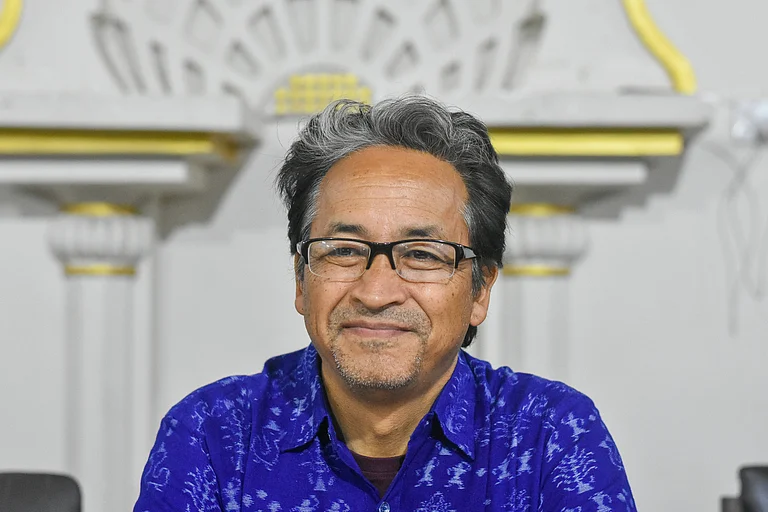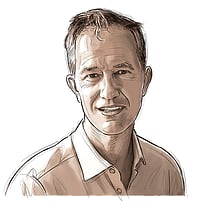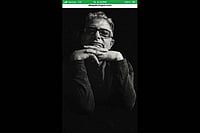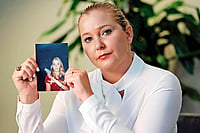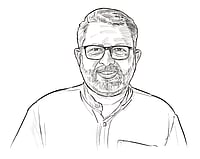
Luke Wallace was born in Vancouver, Canada—a place of incredible natural beauty.
He uses his music to contribute to building a movement that cares deeply about the Earth.
The core message of his songs is humanity’s underlying oneness with the Earth.
Canadian singer-songwriter and filmmaker Luke Wallace (32) has been playing his music since he was a teenager. His songs, rooted in folk traditions and charged with hope, urge people to participate in the fight against climate change and take action. When Wallace performed at Jodhpur RIFF this month, the crowd readily joined in when he asked them to sing along. Requests for audience favourites like ‘Carry the Hope’ and ‘Turning the Tide’ poured in. A smiling Wallace obliged, strumming his guitar as the sun rose over Jodhpur, reassuring everyone that the plan is to work together to heal the Earth, ‘sticking through all the stormy weather’. Wallace spoke to Vineetha Mokkil about art, activism and reasons to hold on to hope. Excerpts:
You were born in Vancouver, British Columbia—a place of exceptional natural beauty. How has it shaped your music?
My upbringing on the West Coast of Canada was very formative. Vancouver has an incredible landscape—there are beautiful mountains nearby in Coast Salish, which is indigenous territory. As a kid, I spent a lot of time hiking, camping in the wilderness. I had two passions: music and ecology. As I was coming into adulthood, I started to think I had to pick one. And then I realised there is a long tradition of songwriters who work on social justice. Musicians like Pete Seeger, Nina Simon, and many Indian artists, too, who work on environmental issues. I pursued a degree in environmental geography at the University of British Columbia. While I was there, I was touring with my music, making documentary films about the threat of pipelines on the West Coast of Canada and the environmental cost. By the time I got my degree, I was keen to pursue music full-time with a strong focus on climate and ecology. The idea was to use music to contribute to building a movement, a culture that cares deeply about the Earth and acts accordingly.
As I started touring with my music and travelling further and further across Canada, I got to see more of the glorious wilderness: forests, rivers, mountains. Everywhere I went, I also saw the visible impact of resource extraction, colonisation, capitalism. You see beautiful rivers and hills. You also see rivers ruined by overfishing, hills stripped bare, corporations and industry encroaching on the land. The contrast is stark. My voice for the movement was shaped by the sight of all this natural beauty and the urgent need to protect it. We are stewards of the land: this is the message of the indigenous people of Canada. The Earth gives us so much and it will continue to provide. We can have a good relationship with it if we try. This has become the core message of my music and my advocacy.
Songs with a message—in fact, any art form with a message—are often labelled ‘preachy. Does that worry you?
My arc as a songwriter has been all about learning how to balance an explicit message with subtlety. I think my early music was a bit blunt. Over time, I’ve been trying to find ways to sneak in the message, especially into the minds of people who may have a different viewpoint than mine; making sure moments of directness are followed by more playful ones. My aim is to be subtle, to find the perfect mix. In a way, I feel I’ve been writing one song in 50 different ways. I’m always searching for the perfect song that can say exactly what the world needs. You know, the perfect mix of peace and action and environment and rage and fun. A reminder of our underlying oneness with the Earth. Of the fact that if the Earth is well, we will be well.
It’s hard not to despair about the state of the world. We are grappling with extreme weather events, global warming, sea rise...
Everywhere I travel—in the US, the UK, Canada, India—I meet thousands of people who care deeply for the Earth and want to be a part of something that heals. Whenever I feel dejected or frustrated, I picture a world with millions of people who care deeply, because there are. The other source of hope for me is the Earth’s amazing capacity to regenerate itself. Even in the face of full devastation, the Earth can rebound in a few years. Science shows us that if given a chance to heal, the Earth can regenerate very, very quickly.
There are only a small number of people on the planet who are ill-intentioned, who mean harm. The rest are kind souls who just want their families to be safe and healthy. They want to feel connected to their communities. Most people mean well, which makes me think that what we are experiencing is primarily a systemic problem. Unfortunately, we are all currently caught in a system that is harming the Earth, but we could pick something different. Something that centres human and non-human wellbeing instead of revolving around profit. And when we choose to see that as the core measure of success, we can heal the Earth, we can be healthy humans.
Environmentalists and people’s movements to protect natural resources are fighting an uphill battle everywhere. The odds are stacked against them, aren’t they?
We have to remember that endless extraction and unbridled economic growth require our participation as well. When we choose to not participate—in a non-violent manner—it will reveal to all of us how powerful the average person is. I think a big part of the success of the powerful is that they have removed, through the mainstream media, our sense of agency. When we reclaim our collective agency and join hands with our neighbours, we can change things very quickly.











